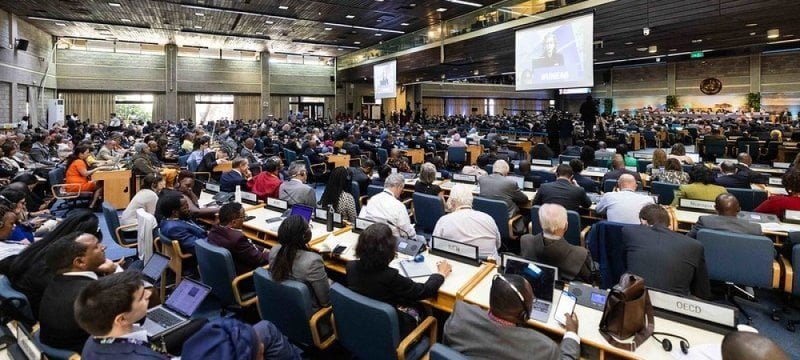Yesterday, the sixth session of the United Nations Environment Assembly (UNEA-6) commenced in Nairobi, Kenya, aimed at addressing the world’s most pressing environmental challenges as the climate crisis intensifies.
Held under the theme of effective, inclusive and sustainable multilateral actions to tackle climate change, biodiversity loss and pollution, the Assembly will run until Friday and is set to bring together more than 7,000 delegates from 182 countries. Delegates span governments, civil society groups, scientists and the private sector.
The meetings are held every two years and set priorities for global environmental policies and the development of international environmental law.
The last meeting, UNEA-5, resulted in a resolution to end plastic pollution. Negotiations for a legally binding agreement on plastics, however, are still ongoing and set to conclude by the end of 2024.
This year, addressing the triple planetary crisis of climate change, biodiversity loss, and pollution is in the spotlight, and countries will consider some 19 resolutions.
These resolutions cover the circular economy, air pollution, solar radiation modification, inclusive climate justice and more.
A call for multilateral environmental action
The first day of the Assembly meeting saw a call for more ambitious multilateral environmental action.
On this, Inger Andersen, Executive Director of UNEP, said: “It is time to lay political differences aside and focus on this little blue planet, teeming with life. Time to lift our sights to our common goal: a pathway to a sustainable and safe future.”
Adding: “We do this by agreeing on the resolutions before UNEA-6 to boost multilateral action for today and tomorrow, and secure intergenerational justice and equity.”
Andersen also spoke on the impacts of the planet’s triple crisis, from extreme heat and soil degradation to pollution and plastic waste filling the oceans.
Further, she noted that while “no one” is ever safe, those who are least responsible for climate change will be worse affected.
“Although the poor and marginalized bear these effects the most, they are the least responsible for them,” she said.
Turning commitment into action
Before the Assembly meeting began this week, in the Report of the Executive Director to UNEA-6, Andersen highlighted six actions countries should consider for more effective, inclusive and sustainable multilateral action.
This included:
- Implementation of the Kunming-Montreal Global Biodiversity Framework;
- Integrated approaches for a water-secure world;
- Responsible mining and sustainable minerals and metals use
- Cooperation around nutrients, especially phosphorus;
- Climate altering technologies and measures; and
- Aligning the financial system for sustainability.
The report also spotlighted the importance of finance and implementation.
“Commitments are many, but implementation is sketchy and financing inadequate. For years, the results of negotiation have not been matched by the requisite finance or action on the ground. This must change,” it said.
“To deliver the necessary solutions, the focus on finance as well as implementation must intensify.”
A platform to drive change
Established in 2012, the UNEA is the world’s highest decision-making body on the environment, and its membership includes all 193 UN Member States.
This year will see delegates gather for a series of leadership and multi-stakeholder dialogues and more than 30 official side events and associated events aimed at moving the dial.
Tomorrow also features a day dedicated to multilateral environmental agreements (MEAs).
On the potential outcomes of the week, with 19 resolutions and two decisions on the table, Andersen said: “Fundamentally, what we want to see here is unity and ambition, in line with the Nairobi spirit that two years ago saw this Assembly gavel a historic decision to launch negotiations towards a global instrument on plastic pollution. So, I am calling on everyone to join forces for strong resolutions, stronger implementation and follow-up action and real inclusive multilateralism that delivers a brighter outlook for people and planet.”
Leila Benali, President of UNEA-6 and Minister of Energy Transition and Sustainable Development for the Kingdom of Morocco, echoed this call: “Our response must demonstrate that multilateral diplomacy can deliver.”
Further, Benali called for delegates to be “self-critical” and work towards “inclusive, networked and effective multilateralism” that can “make a tangible difference to people’s lives.”
“We must also include voices beyond government, of youth, indigenous peoples and local communities, by focusing on issues of gender and human rights, and leaving no one behind,” said Benali.



